Louveciennes
Louveciennes (French pronunciation: [luv(ə)sjɛn] ⓘ) is a commune in the Yvelines department in the Île-de-France region in north-central France. It is located in the western suburbs of Paris, between Versailles and Saint-Germain-en-Laye, and adjacent to Marly-le-Roi.
Louveciennes | |
|---|---|
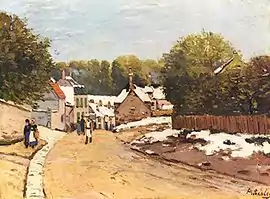 First snow in Louveciennes by Alfred Sisley, 1870 | |
 Coat of arms | |
Location of Louveciennes | |
 Louveciennes 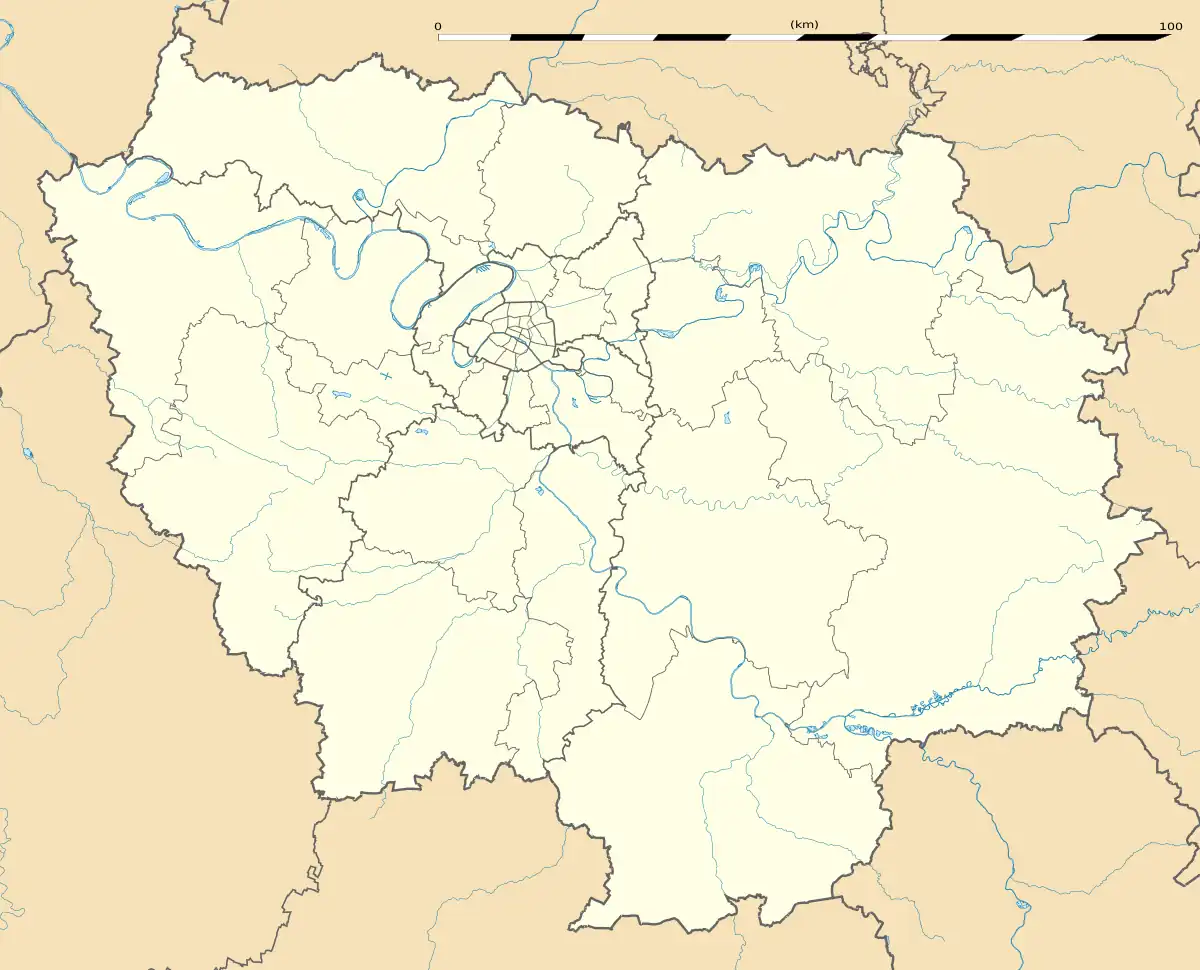 Louveciennes | |
| Coordinates: 48°51′39″N 2°07′02″E | |
| Country | France |
| Region | Île-de-France |
| Department | Yvelines |
| Arrondissement | Saint-Germain-en-Laye |
| Canton | Le Chesnay-Rocquencourt |
| Intercommunality | CA Saint Germain Boucles Seine |
| Government | |
| • Mayor (2021–2026) | Marie-Dominique Parisot[1] |
| Area 1 | 5.37 km2 (2.07 sq mi) |
| Population | 7,342 |
| • Density | 1,400/km2 (3,500/sq mi) |
| Time zone | UTC+01:00 (CET) |
| • Summer (DST) | UTC+02:00 (CEST) |
| INSEE/Postal code | 78350 /78430 |
| Elevation | 80–180 m (260–590 ft) (avg. 140 m or 460 ft) |
| 1 French Land Register data, which excludes lakes, ponds, glaciers > 1 km2 (0.386 sq mi or 247 acres) and river estuaries. | |
Population
| Year | Pop. | ±% p.a. |
|---|---|---|
| 1968 | 4,475 | — |
| 1975 | 7,488 | +7.63% |
| 1982 | 7,338 | −0.29% |
| 1990 | 7,446 | +0.18% |
| 1999 | 7,111 | −0.51% |
| 2007 | 7,247 | +0.24% |
| 2012 | 7,120 | −0.35% |
| 2017 | 7,099 | −0.06% |
| Source: INSEE[3] | ||
Sights
- Many castles from the 17th and 18th century (Chateau des Voisins, Chateau de Madame Du Barry, Chateau du Pont, Chateau du Parc, Chateau des Sources).
- The Château de Louveciennes, built in 1700 by Louis XIV and given to Madame du Barry by Louis XV.
- The Louveciennes Aqueduct of the Machine de Marly
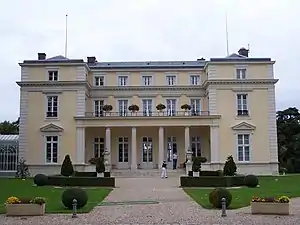 Chateau of Voisins
Chateau of Voisins Chateau of Pont
Chateau of Pont
Culture
Louveciennes was frequented by impressionist painters in the 19th century; according to the official site, there are over 120 paintings by Renoir, Pissarro, Sisley, and Monet depicting Louveciennes.
The composer Camille Saint-Saëns lived in Louveciennes from 1865 to 1870.
Marie Louise Élisabeth Vigée-Lebrun, the most famous female painter of the 18th century, died in Louveciennes on 30 March 1842.
Anaïs Nin was a popular Cuban novelist born in Neuilly, an area in Paris and lived in Louveciennes from 1930 to 1936 at 2 bis, rue Montbuisson. The start of her career as an author started in this town.[4]
Marshal Joseph Joffre, the commander of the French Army at the start of the First World War, built a property, La Châtaigneraie, at Louveciennes, and is buried in its garden.[5] The tomb is not open to the public, and can only be seen at a ceremony on 11 November.
Louis, 7th duc de Broglie, physicist and Nobel Prize laureate, died in Louveciennes 19 March 1987.[6]
Orchestra conductor Charles Munch resided in Louveciennes at Place Emile Dreux, in the village of Voisins during the last decade of his life (1958–68). A plaque to that effect has been placed on the residence.
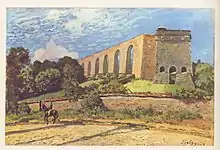 L'Aqueduc à Marly by Alfred Sisley, 1874
L'Aqueduc à Marly by Alfred Sisley, 1874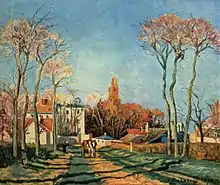 Entrée du village de Voisins[7] by Camille Pissarro, 1872
Entrée du village de Voisins[7] by Camille Pissarro, 1872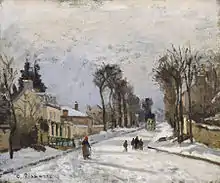 Road to Versailles at Louveciennes by Camille Pissarro, The Walters Art Museum.
Road to Versailles at Louveciennes by Camille Pissarro, The Walters Art Museum.
History
Until 1964, Louveciennes belonged to the former Seine-et-Oise département.
NATO had barracks for SHAPE here from 1959–1967, and the American School of Paris was located nearby from 1959 to 1967.
Transport
Louveciennes is accessible by two Paris metro lines: LINE 17 Saint Nom la Bretèche - Le Chesnay - Versailles Rive Droite and LINE 17S: Maule - Le Chesnay - Versailles Rive Droite. Two bus routes to and from Paris which operate a night service are easily accessible. Lines 55-1 and LINE 55 -2 are used to go to Le Celle Saint Cloud, Bougival, and other western suburbs of Paris.
Economy
After SHAPE left France, the French government allocated the property to CII, which soon thereafter became part of CII Honeywell Bull. Groupe Bull still has offices in Louveciennes.
Twin towns
Louveciennes is twinned with:
 Radlett, United Kingdom, 20 km (12 mi) north of London – since 1983
Radlett, United Kingdom, 20 km (12 mi) north of London – since 1983 Meersburg, Germany, at the shores of Lake Constance – since 1991
Meersburg, Germany, at the shores of Lake Constance – since 1991 Vama, Romania, 450 km (280 mi) north of Bucharest – since 2000
Vama, Romania, 450 km (280 mi) north of Bucharest – since 2000
Notable people
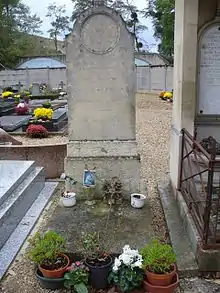
- Christian Braut, musician and photographer
- Marcel Jean, Surrealist painter, writer, and sculptor
- Armand Gagné, adopted son of Marie Antoinette
- Anaïs Nin, author
- Alfred Sisley, Impressionist painter
- Élisabeth Vigée Le Brun, (1755–1842) a prominent portrait painter, official portraitist of Marie Antoinette.[8]
- Maréchal Joseph Joffre (1852–1931), soldier
References
- "Répertoire national des élus: les maires". data.gouv.fr, Plateforme ouverte des données publiques françaises (in French). 1 February 2022.
- "Populations légales 2020". The National Institute of Statistics and Economic Studies. 29 December 2022.
- Population en historique depuis 1968, INSEE
- "Petition to Preserve the House of Anais Nin".
- à 15h53, Par Sébastien Birden Le 10 novembre 2017 (2017-11-10). "Le Maréchal Joffre, un habitant de Louveciennes presque comme les autres". leparisien.fr (in French). Retrieved 2023-05-20.
- Leroy, Francis (2003). A Century of Nobel Prize Recipients: Chemistry, Physics, and Medicine (illustrated ed.). CRC Press. p. 141. ISBN 0-8247-0876-8. Extract of page 141
- Le paysage est peint depuis l'actuelle avenue Saint-Martin, face à l'entrée du château de Voisins (derrière la charette). Il s'agit bien sûr du château actuel reconstruit en 1820.
- May, Gita (2005). Elisabeth Vigée Le Brun : The Odyssey of an Artist in an Age of Revolution. Yale University Press. p. 201. ISBN 9780300108729.